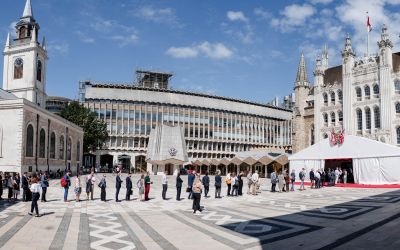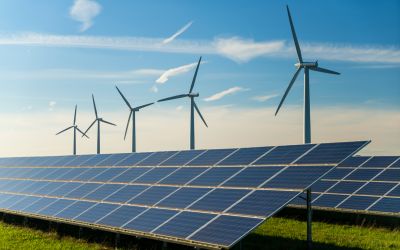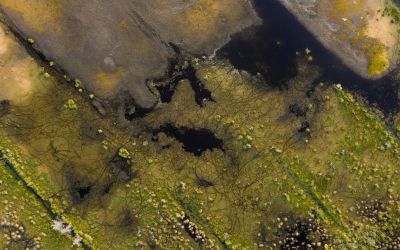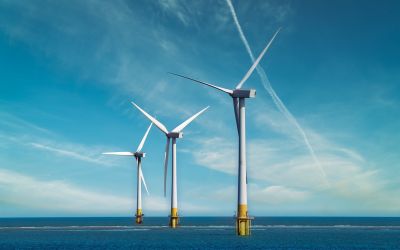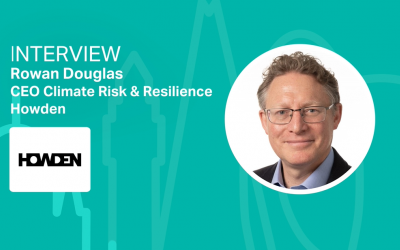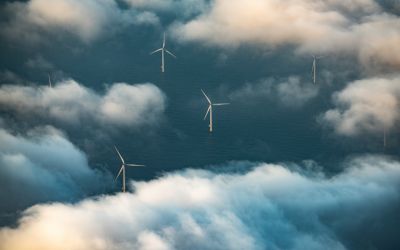5th World Water Forum in Istanbul: Summary
The 5th World Water Forum convened in Istanbul, Turkey, from Monday, 16 March to Sunday, 22 March 2009. The Forum is the largest international event on freshwater, and seeks to enable multi-stakeholder participation and dialogue to influence water policy-making at a global level, in pursuit of sustainable development.
The 5th World Water Forum convened in Istanbul, Turkey, from Monday, 16 March to Sunday, 22 March 2009. The Forum is the largest international event on freshwater, and seeks to enable multi-stakeholder participation and dialogue to influence water policy-making at a global level, in pursuit of sustainable development.
The 5th Forum's main theme, "bridging divides for water," was addressed through six framework themes: global change and risk management; advancing human development and the Millennium Development Goals; managing and protecting water resources; governance and management; finance; and education, knowledge and capacity development.
The Forum theme was explored through more than 100 thematic sessions, seven regional sessions, and a series of political processes involving local authorities, parliamentarians, ministers and heads of State.
A Water Expo, Water Fair, Children's Forum, Youth Forum and meetings of various stakeholder groups, including women, were also held.
More than 25,000 participants attended, representing governments, UN agencies, intergovernmental organizations, non-governmental organizations, academia, business and industry, indigenous groups, youth and the media. An additional 8,000 participants attended the Forum's Water Expo.
The Forum concluded Sunday, 22 March. Its main outputs include a Ministerial Declaration and the Istanbul Water Consensus, agreed to by local authorities.
The following report contains a selection of the sessions convened during the Forum. More detailed information can be found at http://www.iisd.ca/ymb/water/worldwater5/
A BRIEF HISTORY OF GLOBAL WATER ISSUES
Freshwater is a finite resource that is imperative for sustainable development, economic growth, political and social stability, human and ecosystem health, and poverty eradication.
While water issues have long been on the international agenda, the debate on how to meet the growing global demand for freshwater has intensified in recent years: over 800 million people currently lack access to safe drinking water, while about 2.5 billion lack access to adequate sanitation.
In response to these challenges, the World Water Forum was initiated as a platform to include water issues on the international agenda. This Forum is convened every three years by the World Water Council (WWC) and a host country.
The WWC, an international policy think-tank established in 1996, addresses global concerns over the pressures on the Earth's freshwater resources. The Forum is an open, all-inclusive, multi-stakeholder process that aims to: raise the importance of water on the political agenda; support deeper discussions to help solve the international water issues of the 21st century; formulate concrete proposals; and generate political commitment.
The World Water Forum takes place in the context of other international, regional and national water dialogues.
1ST WORLD WATER FORUM: The 1st World Water Forum, held in Marrakesh, Morocco, in March 1997, mandated the WWC to develop a long-term "Vision on Water, Life and the Environment for the 21st Century." This Forum also cautioned against treating water as a marketable good and established priorities, namely: water and sanitation; shared water management; ecosystem conservation; gender equality; and efficient use of water.
2ND WORLD WATER FORUM: The 2nd World Water Forum took place in The Hague, the Netherlands, in March 2000.
The Ministerial Declaration identified key challenges for the future, including: meeting basic water needs; securing food supply; protecting ecosystems; sharing water resources; managing risks; and valuing and governing water wisely.
In the Declaration, ministers agreed to regularly review progress in meeting these challenges and to provide support to the UN system for periodic reassessment of the state of freshwater resources.
UN MILLENNIUM SUMMIT: At the UN Millennium Summit held at UN headquarters in New York, in September 2000, world leaders adopted the Millennium Declaration, which inspired eight Millennium Development Goals (MDGs) with 18 targets, including the target to halve the proportion of people without access to safe drinking water by 2015.
INTERNATIONAL CONFERENCE ON FRESHWATER: The International Conference on Freshwater convened in Bonn, Germany, in December 2001, in preparation for the World Summit on Sustainable Development (WSSD).
The Conference addressed: equitable access to and sustainable supply of water for the poor; strategies for sustainable and equitable management of water resources; integration of gender perspectives; and mobilization of financial resources for water infrastructure.
WSSD: During the WSSD, held in Johannesburg, South Africa, in August-September 2002, world leaders expanded the MDG target on safe drinking water by also agreeing to halve the number of people lacking adequate sanitation by 2015.
Other water-related targets in the Johannesburg Plan of Implementation included the commitment to develop integrated water resource management (IWRM) and water efficiency plans by 2005. Governments, lending agencies and international organizations also launched several voluntary partnerships and initiatives in the area of water and sanitation.
3RD WORLD WATER FORUM: During the 3rd World Water Forum, held in Kyoto, Osaka and Shiga, Japan, in March 2003, ministers adopted a Declaration underscoring the role of water as a driving force for sustainable development.
They also launched the Portfolio of Water Actions, which is an inventory of more than 3,000 local actions with respect to this vital resource.
The "Financing Water for All" report of a high-level panel chaired by Michel Camdessus, former Managing Director of the International Monetary Fund, was presented, leading to the establishment of the intersessional Task Force on Financing Water for All.
29TH G8 SUMMIT: At their annual Summit, held in Evian, France, in June 2003, leaders of the Group of Eight (G8) countries adopted the Action Plan on Water to help meet the MDG and WSSD goals of halving the number of people without access to clean water and sanitation by 2015. In this Action Plan, G8 leaders committed themselves to: promoting good governance; making use of all financial resources; building infrastructure by empowering local authorities and communities; strengthening monitoring, assessment and research; and reinforcing engagement of international organizations.
12TH and 13TH SESSIONS OF THE UN COMMISSION ON SUSTAINABLE DEVELOPMENT (CSD-12 AND CSD-13): At its 12th and 13th sessions held in New York, in April 2004 and April 2005, respectively, the CSD focused on policies and options to expedite the implementation of international commitments in the areas of water, sanitation and human settlements.
The section on water in the CSD-13 outcome document calls for, inter alia: accelerating progress toward the MDGs and the WSSD 2015 water access targets by increasing resources and using a full range of policy instruments such as regulation, market-based tools, cost recovery, targeted subsidies for the poor, and economic incentives for small-scale producers; improving water demand and resource management, especially in agriculture; and accelerating the provision of technical and financial assistance to countries that need help to meet the 2005 target on IWRM.
2005-2015 INTERNATIONAL DECADE FOR ACTION "WATER FOR LIFE": Organized by the UN, the International Decade focuses on the implementation of water-related programmes and projects and on strengthening cooperation on water issues at all levels.
Priorities include: access to sanitation; disaster prevention; pollution; transboundary water issues; water, sanitation and gender; capacity building; financing; and IWRM. Africa is identified as a region for priority action for the Decade.
4TH WORLD WATER FORUM: The 4th World Water Forum was held in Mexico City, Mexico, in March 2006. In their Declaration, ministers emphasized the need to include water and sanitation as priorities in national processes, particularly national sustainable development and poverty reduction strategies.
They reaffirmed commitments to achieve the internationally agreed goals on IWRM and access to safe drinking water and basic sanitation, and underscored the supporting role that parliamentarians and local authorities can play in this regard.
The Declaration also recognized the importance of domestic and international capacity-building policies and cooperation to mitigate water-related disasters.
DEVELOPMENTS SINCE THE 4TH WORLD WATER FORUM
5TH WORLD WATER FORUM PREPARATORY PROCESS: A number of preparatory meetings took place ahead of the 5th World Water Forum, including meetings to advance the Forum's thematic, political and regional processes. The Turkish Women's Water Alliance met twice to define their role in the Forum.
Thematic process meetings: Several multi-stakeholder meetings were held to establish the themes, topics and sessions to guide discussions at the Forum.
Political process meetings: Four Preparatory Committee meetings were held to negotiate the draft Ministerial Declaration and the Istanbul Water Strategy Guide.
The Guide is a non-binding document to create an agenda for action that national governments and their partners can use to address the areas of water resources management, governance and finance.
Parliamentarians met to prepare their agenda for the Forum at the Parliaments for Water meeting in Strasbourg, France, in November 2008. Local authorities met several times, including at the United Cities and Local Government World Council meeting in Istanbul, Turkey, in November 2008, to draft the Istanbul Water Consensus.
Regional process meetings: The Forum's four regions (Africa, the Americas, Asia-Pacific and Europe) and three sub-regions (In and Around Turkey, the Mediterranean, and the Middle East and North Africa and Arab countries) held meetings to prepare for the Forum and identify contributions for the draft Ministerial Declaration.
2008 INTERNATIONAL YEAR OF SANITATION: Organized by the UN, the goal of the International Year of Sanitation was to raise awareness and accelerate progress towards the MDG target on sanitation. The Action Plan for the Year included activities to raise awareness, release and update publications, monitor access and commitments, advance implementation, strengthen capacities, and evaluate costs and benefits.
16TH SESSION OF THE CSD: Held in New York in June 2008, CSD-16 included a review of the implementation of CSD-13 decisions on water and sanitation. Delegates observed that: according to current trends, Africa will realize its MDG targets on water and sanitation no sooner than 2076; the implementation of the CSD-13 decision on IWRM has been slow; and indicators to monitor changes, especially among the poor, are lacking.
Delegates urged: investment for upgrading and maintaining infrastructure, building capacity, and promoting good governance; consideration of transboundary water management; and consideration of the vital importance of financial assistance, particularly for Africa.
34TH G8 SUMMIT: At their annual Summit held in Toyako, Japan, in July 2008, leaders of the G8 countries agreed to reinvigorate their efforts to implement the Evian Water Action Plan, which they will review prior to the 2009 G8 Summit. They further agreed to promote IWRM and "Good Water Governance," with a focus on sub-Saharan Africa and Asia-Pacific, including by: strengthening transboundary basin organizations; sharing water-related expertise and technology with developing countries; and supporting capacity building for water-related initiatives, data collection and use, and adaptation to climate change.
"PEACE WITH WATER": Held in the European Parliament in Brussels, Belgium, in February 2009, and led by former Soviet leader Mikhail Gorbachev, the World Political Forum, the European Parliamentary Groups and the European Research Institute on Water Policy, this meeting called for the inclusion of water issues in a successor agreement to the Kyoto Protocol on climate change.
Participants proposed a Memorandum for a World Water Protocol, focusing on conflict prevention, the promotion of the right to water for all, and safeguarding the global water heritage for future generations.
1ST G77 MINISTERIAL FORUM ON WATER: In their Muscat Declaration on Water, G77 ministers attending this meeting in Muscat, Oman, in February 2009, inter alia: stressed the need to improve South-South exchanges of scientific and technological know-how; called on the UN system to play an important role in supporting relevant research; highlighted the potential of biotechnologies to reduce poverty; and emphasized the need to better understand these technologies. They agreed to meet annually, as necessary.
1ST JOINT FORUM MEETING OF THE NETWORK OF WOMEN MINISTERS AND LEADERS FOR THE ENVIRONMENT (NWMLE): Held in Nairobi, Kenya, in February 2009, this joint meeting between NWMLE and the UN Environment Programme (UNEP) discussed issues also under consideration at the 25th Session of the UNEP Governing Council/ Global Ministerial Environment Forum.
On water, participants recommended that: women be recognized as central to the provision, management and safeguarding of both water and environmental resources; policies and strategies on water and environmental management respect gender differences; and particular attention be given to collecting gender and gender-disaggregated data and developing gender indicators to track implementation of multilateral and national policies.
Click here to read more..
Source: IISD

